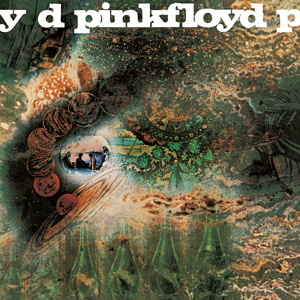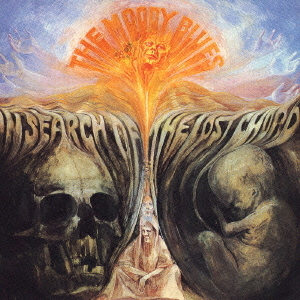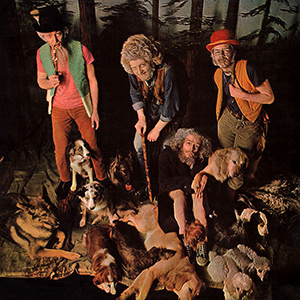Being a child of the seventies, it was through albums like
The Wall and
Dark Side of the Moon that I got into Pink Floyd, and to be honest I never had too much time for, or interest in, their previous, more psychedelic albums. For me, Floyd began with Waters and Gilmour, not Waters and Barrett, and from what I knew of the latter, and backed up by what I've read since, he only held the band back and put them in an impossible situation where they had to first cover for him and then make the difficult decision to part company with him. I don't have much time for “troubled genius”, especially when the problems of same are so usually rooted in the inevitable addictions. To me, this just seems weak and an excuse to abrogate your responsibilities as an artiste, and while many have managed to --- at least for a while --- make the two work together and have often created their best work through the association with drugs or alcohol --- or both --- eventually it seems to me that it's a self-destructive path which, once you're on you have little hope of ever returning from.
All that said, there's no question that it was albums like
Piper at the gates of dawn and this one that got Floyd originally noticed, and so they should not, cannot and will not be pushed into the dark recesses of the history of prog rock; I will not pretend they don't exist and I won't look down my nose at them, but neither to me really represent the Floyd I grew up on and came to love. At the time of their second album though, the association with Barrett was grinding to a juddering and uneasy halt, and Dave Gilmour was brought in initially to help out, for those time when Barrett didn't feel like or couldn't contribute, whether in the studio or onstage. He worked out so well that before the album was even completed Gilmour was already seen as the fourth member of what was technically a quintet at the time, and Barrett and Pink Floyd soon parted ways. Though they wrote tributes to him on later albums, and he arrived at the studio once to watch them play (so completely unrecognisable that the band members took some time to realise it was him) Barrett was never again involved in Floyd and though he attempted a solo career it floundered, after which he basically retired from music. Floyd, of course, would go from strength to strength, achieving world domination status, but always touched by the inner sadness that their friend could not share it with them, and be part of it.
 Album title: A saucerful of secrets
Artiste:
Album title: A saucerful of secrets
Artiste: Pink Floyd
Nationality: British
Label: EMI
Year: 1968
Grade: A
Previous Experience of this Artiste: See
Piper at the gates of dawn
The Trollheart Factor: 7
Landmark value: Although not the sort of Floyd I was used to, this album did feature Gilmour for the first time, led to the departure of Barrett and set the stage for the proper coming of Pink Floyd.
Tracklisting: Let there be more light/ Remember a day/ Set the controls for the heart of the sun/ Corporal Clegg/ A saucerful of secrets (i)Something else (ii) Syncopated pandemonium (iii) Storm signal (iv) Celestial voices (iv)
Comments: It's kind of like something out of Vangelis's playbook as we start off, with a racing, pulsing synth and bass running things, a sound like a sitar occasionally coming through though I doubt they used one at this point, then it breaks down into what would later become a fairly recognised Floyd melody before the vocals from Roger Waters start. My first thought is that this is a lot more what I would call progressive rock than the previous, debut album, and this may be reflected in the fact that Waters writes or co-writes every track here bar two, one being the closer. There's little of the folk/hippies aspect of
Piper to this, so far, that being largely led I assume by Barrett and the way he wanted the band to go.
Good interplay between the guitar and keys here, though in fairness as both Gilmour and Barrett played on the album I can't say who it is on the frets. “Remember a day” has a timeless, spacey feel to it with some fine piano work from Wright. The vocal is very sparse, only a few words all through the whole thing, almost making of it an instrumental, then I and everyone else know the superb “Set the controls for the heart of the sun”, a song which would go on to be included in their stage set for years, even decades to come, and which really put them in the frame as a space-rock band. With almost Ray Manzarekesque keys sort of low in the background, the vocals also hushed, the whole thing gives a sense of dark, gripping tension, danger and a feel of awestruck wonder about it.
“Corporal Clegg” then is the first really out-and-out rock track, sort of sounds like Beatles/Kinks. Not crazy about it, but it does highlight what would go on to become recognisable as the famous Floyd vocal harmonies that would surface on albums from
Dark side onwards. I guess it's fun, I just don't dig it as much as the other tracks I've heard so far. Then we're into the three-part suite that makes up the title track. Again, it's spacey, a bit unnerving in ways and very psychedelic. Could sort of see it havign been the theme to a horror movie maybe. Probably gets a little improvisational for me: I can see this being repeated on the side-long “Echoes” on
Meddle. I wasn't crazy about a lot of that. Much of this is discordant piano notes and weird synth noises; not really for me. It's a bit long too, at nearly twelve minutes. Actually, the end section is really good --- “Celestial voices”?
“See-saw”, the only track written by Rick Wright, is really nice, has a sense of seventies ELO about it. Yes, I know that should be the other way around. Really like this. Nice gentle ballad which, actually now I think about it, really reminds of the Alan Parsons Project. Shut up. The only Barrett song then is the closer, “Jugband blues”, which I expected not to like and don't: it's more of the psych/hippy s
hit I didn't enjoy on much of
Piper.
Favourite track(s): Let there be more light, Remember a day, Set the controls for the heart of the sun, Seesaw
Least favourite track(s): A saucerful of secrets, Jugband blues
Overall impression: A far better album than
Piper, one that points the way towards the direction Floyd were going in and certainly an album more deserving of the term “progressive rock” than its predecessor.
Personal Rating:  Legacy Rating:
Legacy Rating:  Final Rating:
Final Rating: 



















 Linear Mode
Linear Mode
